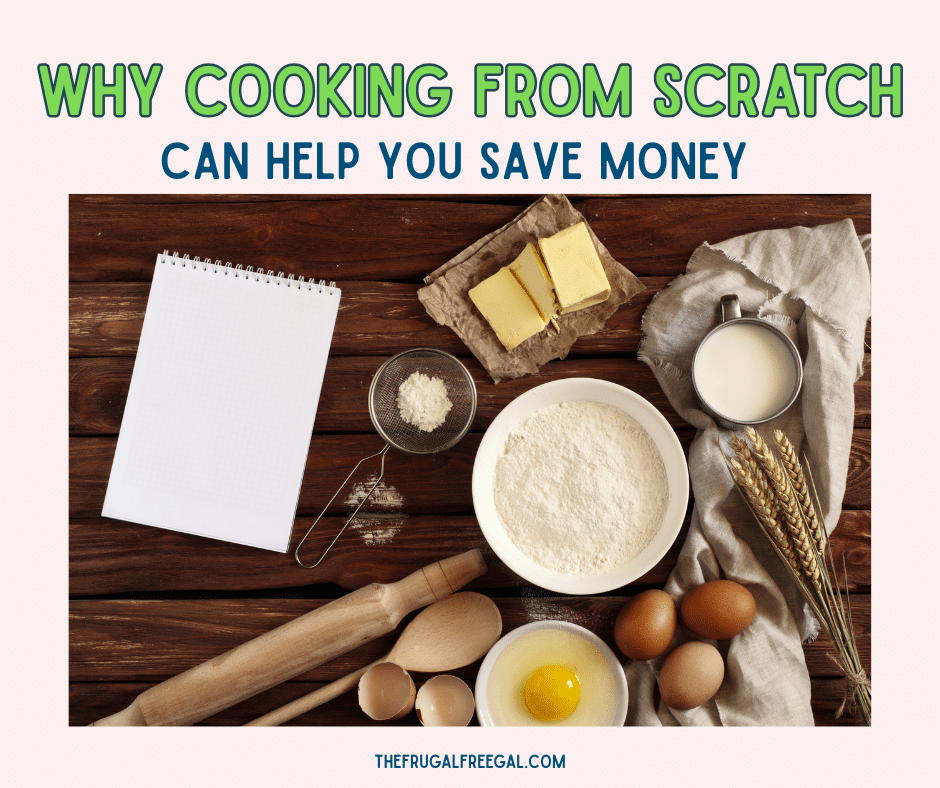
Why Cooking from Scratch Can Help Save Money (And How to Get Started)
If you’re looking for practical ways to stretch your grocery budget and get more bang for your buck, cooking from scratch is one of the best strategies you can adopt.
It’s not just about saving money — it also means healthier meals, less waste, and even some fun in the kitchen.
Whether you’re a beginner or just looking for fresh inspiration, here’s why cooking from scratch can help you save money and how to make it work for your family.
You may also like:
- The Ultimate Guide to Meal Planning
- How to Stock Your Pantry on a Budget
- Creating an Efficient Summer Meal Plan to Save Money and Time
The Real Money-Saving Benefits of Cooking from Scratch
1. Cutting Down on Processed Food Costs
- Pre-packaged meals and convenience foods often carry a premium price.
- Buying raw ingredients like flour, rice, beans, and fresh veggies is cheaper in the long run.
- Example: Instead of buying boxed macaroni and cheese, making it from basic ingredients costs a fraction.
2. Portion Control and Less Food Waste
- When you cook yourself, you control portion sizes — so less food gets thrown away.
- Leftovers can be repurposed creatively into new meals.
- Tip: Freeze extra servings in reusable containers to avoid last-minute takeout.
3. Bulk Cooking Saves Time and Money
- Cooking larger batches means fewer cooking sessions — saving energy and time.
- Bulk meals like soups, casseroles, or chili freeze well and help reduce impulse purchases.
4. Use Versatile, Affordable Ingredients
- Staples like beans, lentils, eggs, potatoes, and seasonal vegetables cost less and go a long way.
- Learning recipes that use similar ingredients reduces shopping list size and waste.
5. Healthier Eating Means Fewer Medical Bills
- Scratch cooking allows control over salt, sugar, and unhealthy fats.
- Healthier diets can mean fewer trips to the doctor and lower healthcare costs.
- This is a money saver that pays off beyond just the grocery bill.
Creative Ways to Make Cooking from Scratch Easier & More Affordable
Plan Ahead Like a Pro
- Meal planning saves money by focusing your shopping and cutting last-minute splurges.
- Use apps or printable meal planners to stay organized.
Join Ibotta and Fetch Rewards apps for more great ways to save and earn rewards!
You can get my free printable meal planner here:
Shop Smart & Seasonal
- Buy produce in season and shop local farmers markets or discount grocery stores.
- Freeze seasonal fruits and vegetables to enjoy later.
DIY Your Favorite Convenience Foods
- Make your own salad dressings, sauces, and even snacks.
- Homemade granola bars, yogurt, and bread cost less and taste better.
Repurpose Leftovers Creatively
- Turn roast chicken into soup or tacos.
- Use vegetable scraps to make broth.
Use Energy-Efficient Cooking Methods
- Pressure cookers, air fryers, and slow cookers save time and electricity.
- These appliances can reduce utility bills and speed up meal prep.
Quick Tips to Save Money While Cooking from Scratch
- Buy in bulk: Grains, nuts, spices, and canned goods are cheaper in large quantities.
- Use coupons & cashback apps: Look for deals on fresh ingredients.
- Grow your own herbs: Even a small windowsill garden cuts costs.
- Freeze leftovers smartly: Avoid waste by portioning meals before freezing.
- Shop with a list: Stick to your grocery list to avoid impulse buys.
- Compare unit prices: Sometimes bigger packages aren’t cheaper per ounce — double-check.
- Prep once, eat twice: Cook once and use ingredients for multiple meals.
Get started today!
Here’s a list of items you can stock your pantry with to start cooking from scratch.
Basic Pantry Stocking for Cooking from Scratch
Grains & Staples
- All-purpose flour
- White or brown rice
- Pasta (spaghetti, penne)
- Rolled oats
- Cornmeal
Canned & Dry Goods
- Dried beans (black, pinto, chickpeas)
- Canned tomatoes
- Tomato paste
- Chicken or vegetable broth
- Canned tuna or salmon
Baking Essentials
- Baking powder
- Baking soda
- Sugar (granulated and brown)
- Salt
- Yeast
Oils & Vinegars
- Olive oil
- Vegetable or canola oil
- Vinegar (white and apple cider)
Herbs & Spices
- Garlic powder
- Onion powder
- Black pepper (ground)
- Dried oregano
- Dried basil
- Chili powder
- Cinnamon
Refrigerated Basics
- Eggs
- Butter
- Milk or milk alternative
- Cheese (cheddar, mozzarella)
Fresh Produce
- Onions
- Carrots
- Potatoes
- Seasonal vegetables
- Fresh garlic
Other Essentials
- Honey or maple syrup
- Peanut butter or nut butter
Frequently Asked Questions About Cooking from Scratch to Save Money
Q: How much money can I realistically save by cooking from scratch?
A: Many families report saving 30-50% on grocery bills by cutting out convenience foods and planning meals.
Q: What are some easy recipes for beginners to start cooking from scratch?
A: Try simple recipes like homemade spaghetti sauce, chili, vegetable stir-fry, or basic soups.
Q: What kitchen tools do I need to get started cooking from scratch?
A: Basic tools like a good chef’s knife, cutting board, pots and pans, measuring cups, and a slow cooker or Instant Pot can help a lot.
Q: How can I save time while cooking from scratch?
A: Batch cooking, meal prepping, and using kitchen appliances like slow cookers or pressure cookers can save hours each week.
Q: Is cooking from scratch healthier than buying pre-made meals?
A: Yes, cooking from scratch allows full control over ingredients, reducing added sugars, sodium, and preservatives.
Q: How do I avoid food waste when cooking from scratch?
A: Plan meals around ingredients you already have, freeze leftovers, and repurpose scraps (like veggie peels) into stocks or compost.